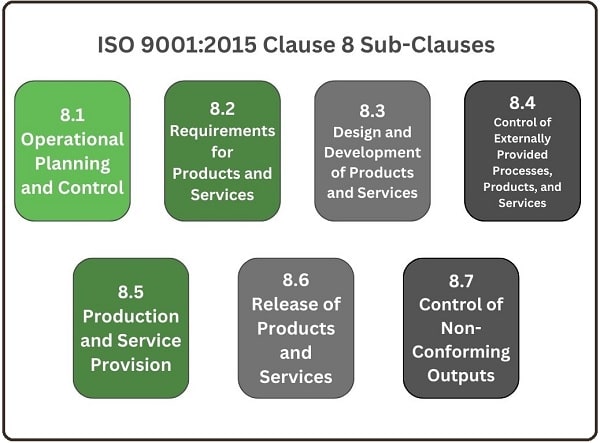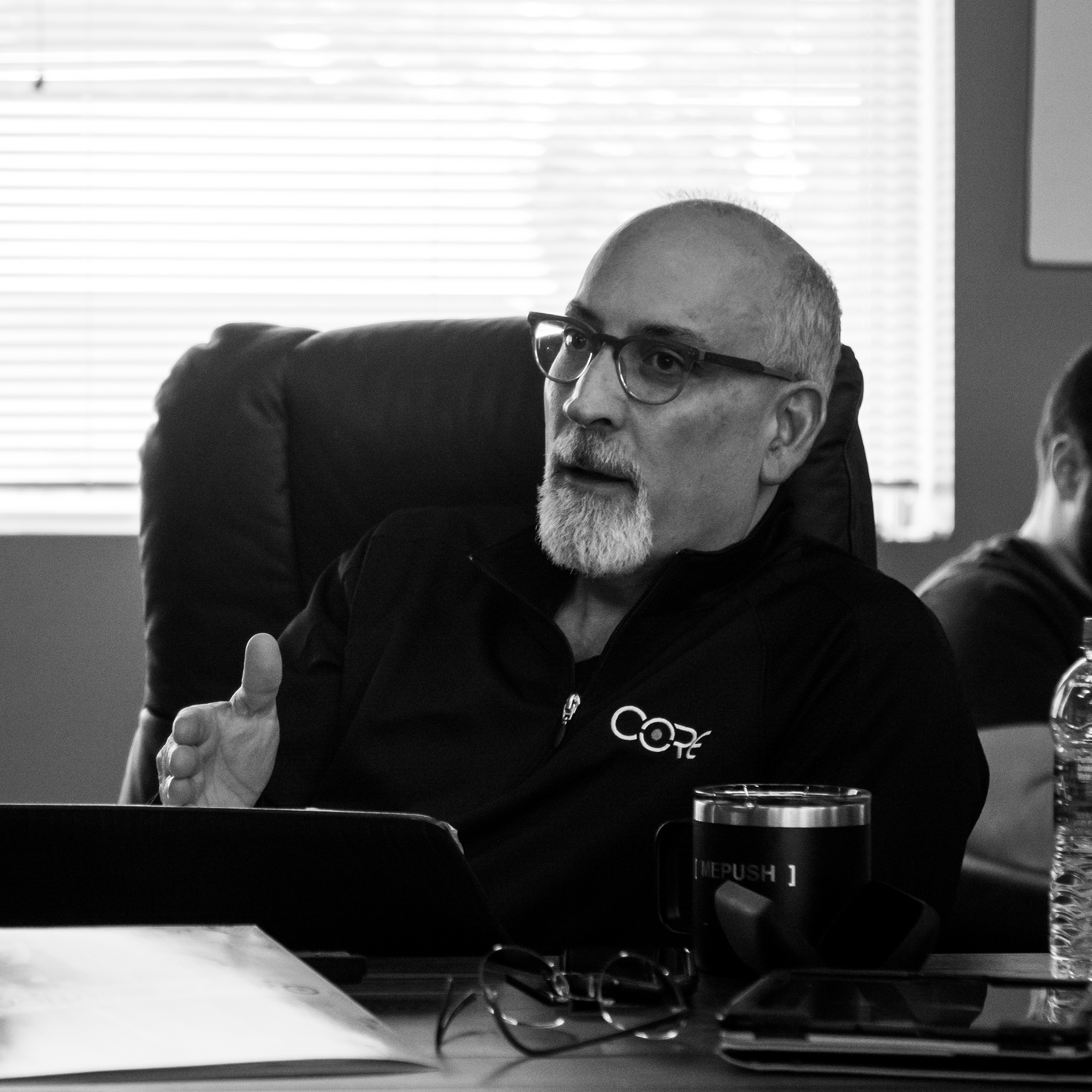ISO 9001:2015 Clause 8
What is the ISO 9001:2015 Clause 8 About?
Clause 8 of the ISO 9001:2015 standard, titled “Operation,” serves the purpose of outlining the requirements for the planning, execution, and control of the operational processes within a quality management system (QMS). The overall purpose of this clause is to ensure that organizations effectively carry out their processes and activities to deliver products and services that meet customer requirements and achieve the organization’s quality objectives.
Clause 8, Operation, focuses on the effective execution of processes, encompassing various activities such as planning, design, and development (if applicable), production, service provision, and release. It aims to ensure that organizations have robust controls and measures to maintain product and service quality, prevent nonconformities, and continually improve their operational performance.
The Specific Objectives of Clause 8, Operation, are as follows:
1. Operational Planning and Control:
Organizations are required to plan and control their operational processes to ensure that products and services are delivered in a consistent and controlled manner. This includes determining process criteria, establishing process controls, and defining methods for monitoring, measuring, and analyzing process performance.
Get a Free Quote
2. Customer Communication:
The clause emphasizes the importance of effectively communicating with customers regarding product information, inquiries, contracts, and orders. Organizations must ensure that customer requirements are understood, documented, and met throughout the product or service lifecycle.
3. Design and Development (if applicable):
If the organization engages in design and development activities, Clause 8 specifies the requirements for planning, executing, and controlling the design and development processes. This includes determining design inputs, conducting reviews, verifying and validating designs, and controlling design changes.
4. Controlling Outsourced Processes:
If the organization outsources any processes that affect product conformity, it must ensure that the control of such processes is adequately defined, documented, and monitored. This includes selecting competent suppliers, defining requirements for outsourced processes, and verifying the effectiveness of their performance.
5. Production and Service Provision:
Organizations must establish and maintain processes for the production and delivery of products and services. This involves defining requirements for product realization, ensuring product conformity, and controlling production and service provision activities to prevent nonconformities and meet customer expectations.
6. Release of Products and Services:
The clause outlines the requirements for the verification, validation, and approval of products and services before their release to customers. This includes ensuring that all specified requirements have been met, conducting necessary inspections or tests, and obtaining customer or authorized personnel approval.
Establish a Systematic Approach
By addressing the objectives of Clause 8, organizations establish a systematic approach to planning, executing, and controlling their operational processes within the QMS. This ensures that products and services are consistently delivered in accordance with customer requirements, quality objectives, and applicable regulatory requirements.

Complying with Clause 8
Complying with Clause 8, titled “Operation,” in the ISO 9001 Standard involves implementing and controlling the processes needed to meet customer requirements and achieve the organization’s quality objectives.
Here are some examples of how an organization can comply with Clause 8:
1. Product/service design and development:
Establish a systematic process for product or service design and development. This includes defining customer requirements, conducting feasibility studies, creating design specifications, and verifying and validating the design before finalizing it.
2. Control of externally provided processes, products, and services:
Implement controls to ensure that externally provided processes, products, and services (such as suppliers, contractors, or outsourced processes) meet the organization’s quality requirements. This may involve supplier evaluation, monitoring performance, and conducting audits to ensure compliance.
3. Production and service provision:
Establish and maintain effective controls for production and service provision processes. This includes defining and following standardized work procedures, conducting regular inspections, and implementing quality checks at critical stages to ensure conformance to requirements.
4. Release of products and services:
Establish criteria for the release of products and services to ensure they meet specified requirements. This may involve final inspections, testing, or customer approval before releasing the products or services for delivery.
5. Control of nonconforming products and services:
Develop procedures to identify, document, and control nonconforming products or services. Define appropriate actions to segregate, correct, or dispose of nonconforming items, and ensure that personnel are aware of the procedures and follow them accordingly.
6. Change control:
Implement a change control process to assess and manage changes to processes, products, or services. This includes evaluating the impact of proposed changes, obtaining necessary approvals, communicating changes to relevant stakeholders, and ensuring proper implementation and verification.
7. Preservation of products and services:
Define measures to preserve the conformity of products and services during handling, storage, packaging, and delivery. This includes appropriate storage conditions, protection against damage or deterioration, and proper identification and traceability.
8. Control of monitoring and measuring equipment:
Establish procedures for the calibration, verification, and maintenance of monitoring and measuring equipment used to verify product or service conformity. This ensures the accuracy and reliability of measurements.
9. Management of organizational knowledge:
Implement processes to capture, preserve, and share organizational knowledge to ensure the effective operation of the QMS. This includes documenting best practices, lessons learned, and critical knowledge, and facilitating knowledge transfer between employees.
10. Process performance monitoring and measurement:
Establish a system for monitoring and measuring key process performance indicators to evaluate the effectiveness and efficiency of operations. This may involve collecting data, analyzing trends, and taking corrective or preventive actions based on the results.
Compliance with Clause 8 ensures that the organization effectively carries out its operations and controls the processes involved in delivering products or services. By addressing design and development, external controls, production and service provision, nonconformity management, change control, preservation, equipment control, knowledge management, performance monitoring, and measurement, organizations can consistently meet customer requirements, improve product quality, and enhance customer satisfaction.
A History of ISO 9001 Clause 8
Clause 8 of the ISO 9001 standard, titled “Operation,” has undergone changes and refinements throughout the history of the standard. Let’s explore the evolution of Clause 8 over the different versions of ISO 9001:
ISO 9001:1987:
The initial version of ISO 9001, published in 1987, did not have a dedicated clause for “Operation.” The standard primarily focused on quality assurance and control processes, without explicitly addressing the operational aspects of a quality management system (QMS).
ISO 9001:1994:
In the 1994 revision, ISO 9001 introduced the concept of a “Quality System” in Clause 4, which encompassed some operational requirements. However, there was no dedicated clause solely focused on the operational activities within the QMS.
ISO 9001:2000:
The year 2000 brought significant changes to ISO 9001, including the introduction of the High-Level Structure (HLS) developed by ISO. Clause 7, titled “Product Realization,” was introduced to address the operational aspects of the QMS. It encompassed requirements related to planning and controlling product realization processes, customer-related processes, design and development, purchasing, and production and service provision.
ISO 9001:2008:
The 2008 revision did not bring major changes to Clause 8. The requirements remained consistent with the previous version, focusing on product realization, including design and development, purchasing, and production and service provision.
ISO 9001:2015:
The 2015 revision of ISO 9001 brought significant changes to Clause 8. It was restructured and expanded to provide a more comprehensive approach to the operational activities within the QMS. The revised clause, titled “Operation,” includes requirements related to planning and controlling the organization’s operational processes.
ISO 9001:2015 introduced specific sub-clauses under Clause 8, including:
8.1 Operational Planning and Control
8.2 Requirements for products and services
8.3 Design and development of products and services
8.4 Control of externally provided processes, products, and services
8.5 Production and service provision
8.6 Release of products and services
8.7 Control of Nonconforming Outputs
The current version of ISO 9001, ISO 9001:2015, places significant emphasis on the operational activities required to deliver products and services that meet customer requirements. It requires organizations to plan and control their operational processes, define and manage product/service requirements, implement design and development processes, control externally provided processes and products, and ensure effective production and service provision.
By incorporating operational requirements, ISO 9001:2015 ensures that organizations have systematic processes in place to deliver products and services consistently and according to customer expectations. It emphasizes the importance of quality planning, risk management, effective design and development, and controls throughout the production/service provision cycle.
Overall, Clause 8, Operation, in ISO 9001:2015 recognizes the significance of operational processes in achieving quality objectives and customer satisfaction. It helps organizations establish robust operational practices, control product/service realization, and ensure the delivery of high-quality outputs.
Consulting Support for ISO 9001
Every year, we help hundreds of small businesses achieve ISO 9001 certification. Support for ISO 9001 is available through any of our Consulting Programs
As an American business with a story like yours, we know that time is valuable. Our expert consultants are here to take on the difficult, technical aspects of certification so you can focus on your business. They’ll work with you every step of the way until you’re successfully certified.
Interested? Get a Free Quote.
In many industries, ISO 9001 has become a supply-chain requirement. When landing a big contract, ISO 9001 certification could make all the difference.

About Core Business Solutions
"Core Business Solutions was started by my brother, Mike Dawson, and myself, true entrepreneurs at heart looking for a better way to make a living and help small businesses improve the quality of the products and services they provide.
The bottom line: we are real people that have developed a team to come along side you to help you grow and succeed."
-- Scott Dawson, President
Related Standards
We provide consulting support for various other standards, as well as support for companies seeking multiple certifications through an Integrated Management System.
AS9100
Aerospace Manufacturers
AS9120
Aerospace Distributors
ISO 14001
Environmental Management Systems
ISO 27001
Information Security Management Systems
ISO 20000-1
Service Management Systems
ISO 45001
OH&S Management Systems
ISO 13485
Medical Device Manufacturers
AS9100
AS9120
ISO 14001
ISO
20000-1
ISO 27001
ISO 45001
ISO 13485
Equip Your Business to Meet ISO 9001 With CORE
At Core Business Solutions, we’re here to equip your company for success in meeting ISO 9001 requirements. We’ve helped hundreds of small businesses grow and deliver the best solutions to their clients. We provide ISO training services, consulting help, and compliance software and to help you get certified and stay certified. We focus on optimizing your processes and helping you implement an ISO-compliant QMS. When you partner with us, you’ll get the tools and help you need for success.
For more information on the ISO 9001:2015 standard, please visit our articles page. You can also call our consulting office at 866-354-0300.
Do you want to update your existing ISO 9001 QMS System or refresh it?
We provide consulting services to assist you in your ISO 9001 Quality Management System refresh. We listen, conduct a gap analysis, update your Quality Policy and any necessary documentation or procedures, find areas of waste or improvement, simplify and automate. And we do it fast. Core offers firm, fixed pricing. Download our information sheet today to learn more or call us at 866-354-0300 Extension 2.
